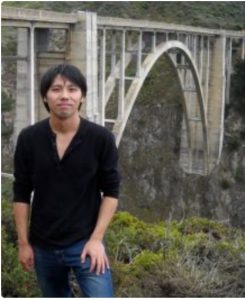As part of the Duke Graduate School’s Bass Online Apprentice Fellowship program, Ph.D candidates Lok Chan and Ashley Rose Young will participate in an online apprenticeship with the Center for Instructional Technology (CIT), gaining valuable experience in online college teaching, course development, and instructional design. The Bass Online Apprentices (Bass OA) will work with Duke faculty and CIT consultants on innovative online projects, and will produce a PebblePad portfolio highlighting their learning, skills, and online project they develop.
CIT values the unique background each Bass OA brings to the apprenticeship experience, including their Duke teaching experience.

Lok Chan (Ph.D. candidate in Philosophy) taught Philosophy 150 (Logic) at Duke from Summer 2014 to Spring 2016. Lok said he is deeply impressed by Duke’s open-minded and experimental spirit, and the tremendous support to develop new approaches to teaching, as well as Duke students’ willingness to try out new ways of learning in class.
Due to the nature of the course I was teaching (a technical course within a humanities department), I became cognizant of the importance of providing instruction in ways that make sense to the backgrounds of my students. I was convinced that instructional technology is the key to satisfy these goals and that online education has always been the leader in that area. For these reasons, I decided to become a Bass OA. – Lok Chan
In addition, Chan has a number of campus affiliations including Bass Connections graduate student team leader, PhD Labs Fellow, Digital Humanities Lab, Versatile Humanists at Duke advisory board member, Graduate Student Training Enhancement Grant recipient, and Graduate School Professional Development Grant recipient. Reflecting on his experience, Chan notes:
I think my engagement in various highly interdisciplinary projects will bring a unique perspective to the apprenticeship. Working with computer scientists, mathematicians and neuroscientists as a philosopher, I gained valuable experience in bridging the gap between the humanistic and the technological. – Lok Chan

Ashley Rose Young, a Ph.D candidate in History, is a co-founder and member of the Duke Digital History Working Group, and a past scholar and mentor of the PhD Lab in Digital Knowledge. Young completed the Preparing Future Faculty (PFF) program, and all requirements for the Certificate in College Teaching (CCT) program, offered through the Graduate School. Young has worked as a graduate intern at the Rubenstein Rare Book & Manuscript Library as a Hartman Center Graduate Fellow.
Young’s unique set of experiences motivated her to apply to the program:
I decided to become a Bass OA because I am interested in the hybrid, innovative pedagogy of online teaching. I believe that we can harness both digital tools and open access content to enrich higher education as well as educational programming for general audiences. I am particularly interested in developing content that breaks down the barrier between the academy and the public, fusing deep historical research with accessible data and analysis. In doing so, I am able to inhabit my identity as a public scholar, one whose research is accessible and comprehensible to broad audiences. – Ashley Young
Young has also taught her own section of American Business History at Duke. Most recently, she was a Graduate Intern Fellow, Division of Work and Industry, Smithsonian Food History Project, at the Smithsonian National Museum of American History.
What does each Bass OA hope to gain from the apprenticeship?
I hope to gain skills and practical experience in the development of online learning materials. I also would like to learn about data-driven and quantitative ways in which we can evaluate students’ performance. – Lok Chan
I hope to develop innovative class projects that employ digital tools and pedagogy to enrich students’ understandings of American history. Specifically, I am interested in creating a class project that both studies and preserves the soundscape of antebellum America. – Ashley Young
Interested in Applying to the Bass Fellowship Program?
Sophia Stone manages the program for CIT and will meet with students who have an interest in learning more about project assignments and the apprenticeship experience. Students apply directly through the Graduate School. The application cycle opens in early October and closes in late November. Award recipients will be notified in mid-December. The Graduate School will announce exact dates closer to the start of the cycle, and they will be posted with the award listing on the school’s online application system.
Learn More
To address the need of preparing graduate students for online teaching as part of their future academic work, the Graduate School implemented the Bass Online Apprentice Fellowship Program, in partnership with the Center for Instructional Technology (CIT) in Fall 2013. Organizationally a part of the Certificate in College Teaching, the program is designed to provide graduate students practical experience with both online course design and development, and online course implementation and teaching.
To date, CIT has placed 12 students in online apprenticeships. A recent survey and summary report confirmed the program continues to meet its intended goal of providing professional development for graduate students in the area of online teaching.
Previous online apprenticeship projects
- Bass Online Apprentice Develops Diverse Skill Set to Teach Online
- Innovative Teaching in Undergraduate Philosophy
- Bass Online Apprentice Collaborates to Create Global Online Learning Experience
- Online Teaching: New Skills for CIT’s Bass Online Apprentices
- Bass Online Apprentices Share the MOOC Student Experience
- Preparing Future Faculty for Online College Teaching
